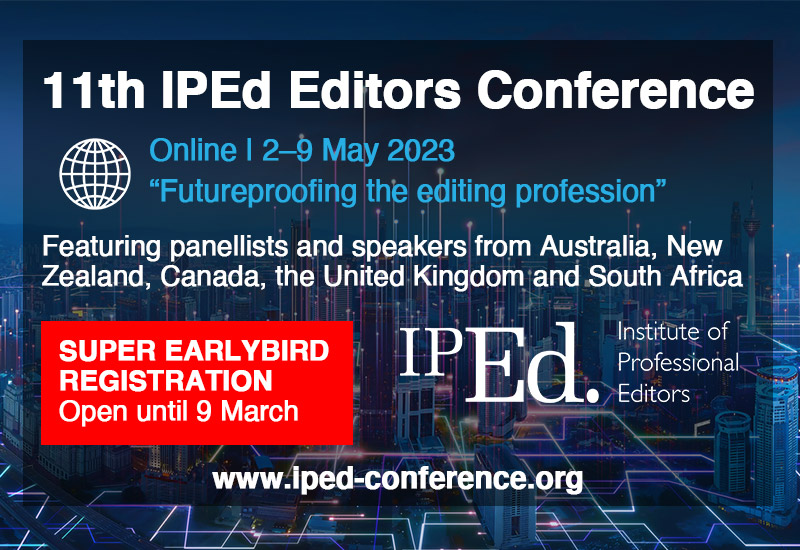Would you like to do a professional development intensive or two that could help kickstart or futureproof your editing career? We’re pleased to announce that the workshops for the 11th IPEd Editors Conference have been confirmed and are listed below. These workshops are highly practical and run by industry leaders, and you can register for the “workshop package” to access an AM workshop, and a PM workshop.
To ensure quality of experience, conference workshops are capped at 30 spots each, so we’d recommend that IPEd members book soon to avoid disappointment. Our super earlybird pricing ends on 9 March and also applies to the workshop package registrations.
| Workshop number | Time | Presenter and session title |
| 1 |
|
Write Limited’s workshop for emerging editors – Thomas McGrath, Write Limited, NZ |
| 2 |
|
Futureproofing your business: Strategies for getting a steady supply of enquiries as a freelance editor – Malini Devadas |
| 3 |
|
Writing and editing the “other” in fiction and creative non-fiction – Renée Otmar, Renée Otmar Consultancy |
| 4 |
|
Beyond Word: open-source editing tools – Darren Goosens, Biotext |
About the 11th IPEd Editors Conference
Our highly anticipated biennial event is open to freelance and in-house editors, publishers and people from related professions from all levels of experience. It also features a panel of international speakers from Canada, the United Kingdom and South Africa as well as a publisher’s panel from Australia and New Zealand.
With the theme of the 11th conference being “Futureproofing the editing profession”, it will be highly relevant for anyone watching the fast-changing face of publishing.
“Editors have seen many developments in the last 20 years of the digital era and that is just accelerating,” IPEd CEO Karen Lee said. “We have increasing commercial pressure on publishers, a pandemic that is changing how people access information and now the emergence of the next generation chatbot: ChatGPT. But we’re also making great strides in improving accessibility and the reach of materials for all users.”
The conference will include keynote speaker presentations, workshops, panels and “inside the mind of” interviews which will be focused on the challenges and opportunities facing the editing profession.
“Our panel of international editors will discuss what our counterpart organisations are doing to prepare for the future and how this affects the editing profession, and attendees will also have the opportunity to network and meet international peers,” Lee said.
The program includes keynote sessions from Dr Sandra Phillips, Associate Professor of Indigenous Australian Studies and Publishing Studies, Western Sydney University, who will present on “Better books: Cultural intelligence and Indigenous strengths in editing”, and from Joel Naoum, Head of Trade Product, Booktopia, who will speak about “5 tips for optimising your metadata to boost book sales”.
Other sessions include “Implications of AI on publishing and editing” by Inspiring STEM Founder and Managing Editor Martin Delahunty, “Information design as a fourth type of editing” from Rebs Harris AE, technical writer and academic editor; “Neurodivergence and editing: A view from inside” from Dr Louise Merrington AE (Australia) and Tanja Gardner (New Zealand), who are both authors and editors and “Trauma-informed editing practice: A framework” from Camilla Cripps, editor.
IPEd Chair Ruth Davies said: “Editors are well known for being resourceful and nimble in responding to the rapid changes in their industries. We believe this year’s conference program reflects the vital skills needed in an editor’s toolkit to remain current and responsive.”
Members of IPEd and affiliate organisations – the Australian and New Zealand Society of Indexers, the Chartered Institute of Editing and Proofreading, the Editorial Freelancers Association, Editors Canada, the National Association of Independent Writers and Editors and the Professional Editors’ Guild – can purchase tickets at member-only rates.
Visit the conference website to see the program, find out more about the speakers and book your ticket: www.iped-conference.org/

